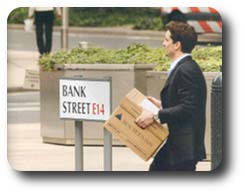Wednesday 4 November, 4.00pm until 6.00pm, St John's College, University of Oxford
 Venue: St John’s College, University of Oxford, St Giles, Oxford, OX1 3JP
Venue: St John’s College, University of Oxford, St Giles, Oxford, OX1 3JP
Tickets: FREE but to reserve a place e-mail .(JavaScript must be enabled to view this email address). Tickets are available from the Academy of Ideas website.
There will be a drinks reception hosted by PricewaterhouseCoopers LLP (PwC) following this event.
Many commentators have suggested today’s economic problems highlight a crisis in morality as much in the financial sector. It is argued that one of positive outcomes emanating from the shock-waves of the recession is that it opens up a space to assess society’s values. Of course, how we decide on future virtuous behaviour depends on our interpretation of past sins, on what and who we blame and for today’s difficulties.
The economic crisis is regularly presented as ‘payback time’ for human greed. The Labour-left Compass group notes approvingly that ‘In the current recession various corrections are taking place: blanket free-market approaches are being rejected, as are blanket individualistic and materialistic attitudes’. Green thinkers see the crisis as a timely reminder that we must curtail our economic activity and carbon-emitting lifestyles; maybe now we will finally accept the environmentalist mantra that less is more. Many argue for ‘Post-Crunch Corporate Ethics’ to rein-in risky ventures and penalise big business excesses. Some even argue the inevitable austerity on the horizon could encourage a return to shared values and bring a new social cohesion.
These cultural critiques of capitalism all agree we have over-reached ourselves, allowed economic growth to distort our priorities, and sacrificed the planet, and our own well-being on the altar of ‘filthy lucre’. But might we be learning the wrong lessons? If we demonise the aspiration to wealth as ‘greed’, how will society reward success and encourage the competitive spirit that so often drives social progress? What about innovation and experimentation? If every day, greedy bankers and capitalism-gone-mad are blamed for it all, while trust in politicians and the institutions of government is at historic lows too, who and what do we look to to change society for the better? Can we use the crisis as a spur to re-invent political and economic life?
The event will start by a short welcome introduction from Dr Chris Bickerton, lecturer, politics, University of Oxford; co-editor, Politics Without Sovereignty; blogger, Le Monde Diplomatique.
Watch the session video...
 | Professor Frank Furedi sociologist and social commentator; author, What's Happened to the University?, Power of Reading: from Socrates to Twitter, On Tolerance and Authority: a sociological history |
 | Dr Maria Grasso lecturer in politics and quantitative methods, Department of Politics, University of Sheffield; author: Generations, Political Participation and Social Change in Western Europe |
 | Leo Johnson partner, PwC Sustainability & Climate Change; host, BBC World's Down to Business |
 | Marc Kidson undergraduate, PPE, St. John's College; comment editor, Cherwell; former president, Oxford University European Affairs Society |
 | Richard Reeves director, Demos; political columnist, Prospect; author, John Stuart Mill: Victorian firebrand |
| Chair: | |

|
Claire Fox
director, Academy of Ideas; panellist, BBC Radio 4's Moral Maze; author, I Find That Offensive |
Centuries ago, historians came up with a classic theory to explain the rise and decline of nations. The theory was that great nations start out tough-minded and energetic. Toughness and energy lead to wealth and power. Wealth and power lead to affluence and luxury. Affluence and luxury lead to decadence, corruption and decline.
David Brooks, New York Times, 28 September 2009